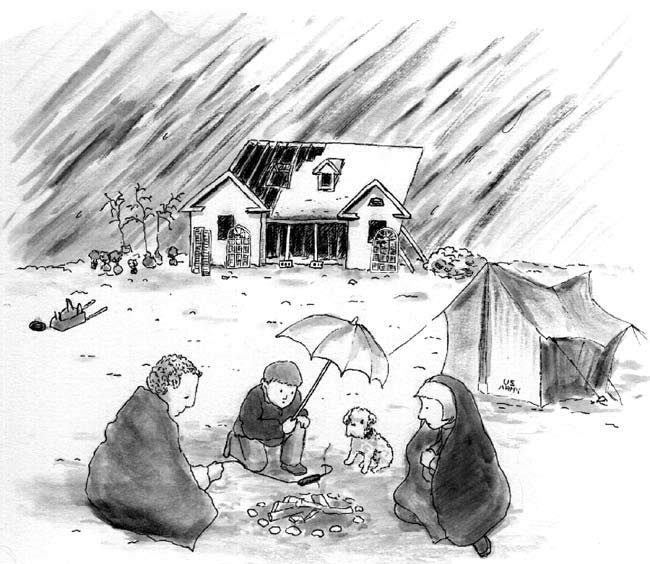 How much will this house cost to build?
How much will this house cost to build?
I get this question several times every day.
It’s all about using averages for guesswork. I even wrote a book that talks about construction cost. It’s called IF I’D KNOWN THAT WAS GOING TO HAPPEN WHEN I BUILT MY HOUSE, I MIGHT’VE GONE CAMPING INSTEAD. It’s on Amazon, here.
The following illustrations from the book say it all.
The front of the house of luxury most people desire (below) :
The back of the house most people can afford (below) :

A minute before starting this post I received an email asking, “How many square feet can be in a home with one story, 3 bedrooms, 2 bathrooms, 1 half bath and a 2 car garage, and with our budget being no more than $300,000.00?”
Maybe it’s better to offer some guidance on the arithmetic of square footage and cost, which I qualify in the book.
First of all we’re dealing with a little-understood, terribly underused term called Total Area.
Total Area is the combination of all parts of a house, including living area, garage area, and covered porches.
For Additions and Renovations, Total Area includes anything that is built or changed.
The WRONG way to think about it : Some people calculate cost for an entire house based on living area only, but promise that this will pay for a garage and porches. For example, here’s an often heard quote, “$120 p.s.f. of living area comes with a double garage and a back porch.” This logic is poor. Accurate cost projections cannot be calculated for a whole house by leaving parts out. What if a house doesn’t have a garage and back porch? Why do the same people still hold to the same numbers? It’s bad reasoning. Accounting for all with only part doesn’t work.
The RIGHT way to think about it : The whole house has to be built to get the individual parts. The TOTAL AREA has to be counted so partial areas will be included.
Obviously it doesn’t cost as much to build an empty garage or an empty bedroom as it does a Kitchen or Bath Room. But even limited to a Kitchen, the empty floor space in the middle of the room might cost only $80 per square foot, but the space around the edge holding the cabinets could range between $200 and $1000 per square foot. So, for convenience we lump it all together and use averages for guesswork. But, that’s all we’re doing, guessing. It takes an entire, complete set of professionally prepared drawings and specifications to arrive at an accurate construction cost, and those plans must be interpreted by an experienced professional home builder.
Now to apply this :
In America the common national average for dollars per square foot for a modestly appointed home is $100 per square foot of ‘TOTAL’ area.
For a luxuriously appointed house, the cost per square foot could run from $150 p.s.f. up to above $500. For ultra-luxury the sky’s the limit.
In addition, patios, decks, driveways, walkways, landscaping, even a septic tank system will use up available funds.
Knowing this, and staying with modest moderation, we can reason that the total area of a house, buildable for $300,000.00, must be less than 3000 square feet.
A typical Double Garage is about 600 square feet. A typical Front Porch, just covering the front door, is about 60 square feet. A Back Porch with enough room for a table and chairs and possibly a swing should be at least 200 square feet. All of these areas added together total 860 square feet. Subtract that from 3000 to leave a maximum heated area of 2140. But keep in mind that patios, decks, driveways, walkways, landscaping, and a septic tank, will all have to be paid for from the same construction budget.
I hope this knowledge will help you narrow the field in your search for the perfect home. By concentrating on the TOTAL AREA, and applying some basic arithmetic, you can arrive at a dollar figure for building cost that’s, at least, a reasonable guess.
Thank you,
Andy Bozeman
Andy Bozeman is the author of
IF I’D KNOWN THAT WAS GOING TO HAPPEN WHEN I BUILT MY HOUSE, I MIGHT’VE GONE CAMPING INSTEAD
Available from Amazon Kindle
See similar educational articles related to the American dwelling industry at
American Home Journal, also by Andy Bozeman.

